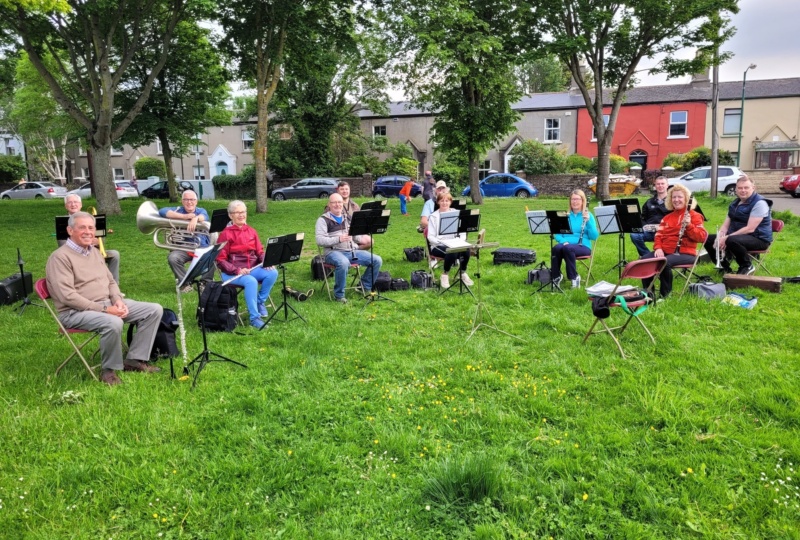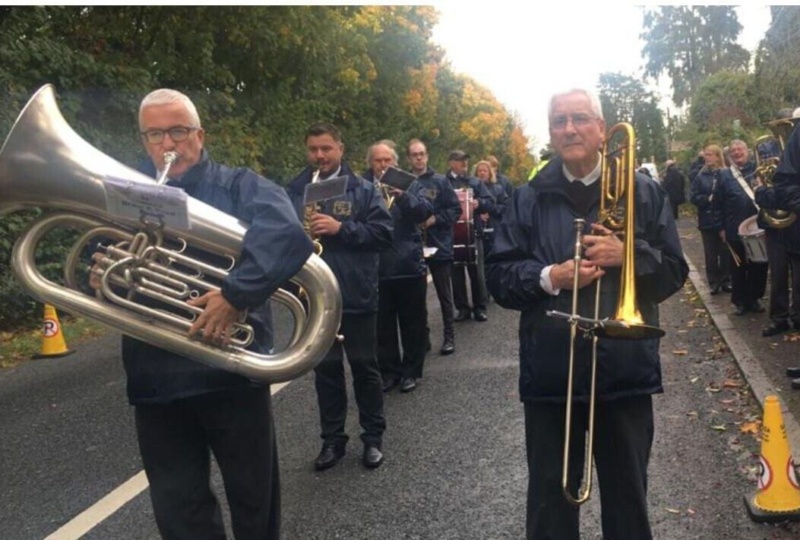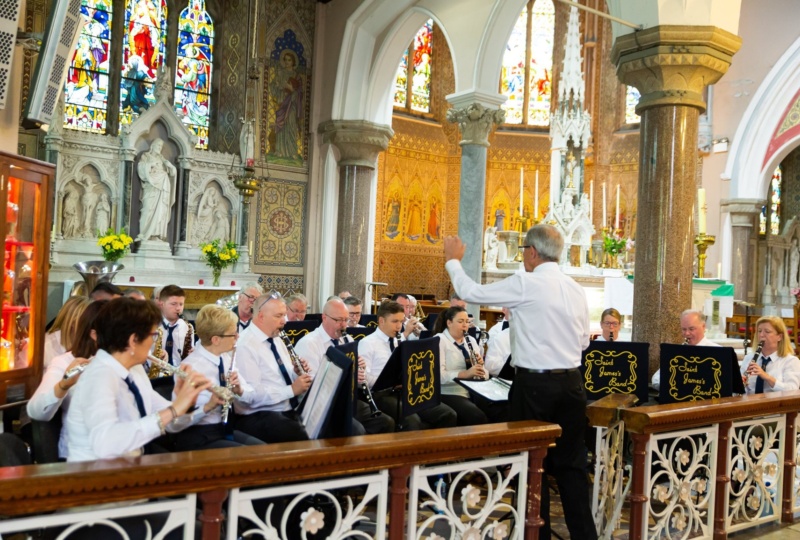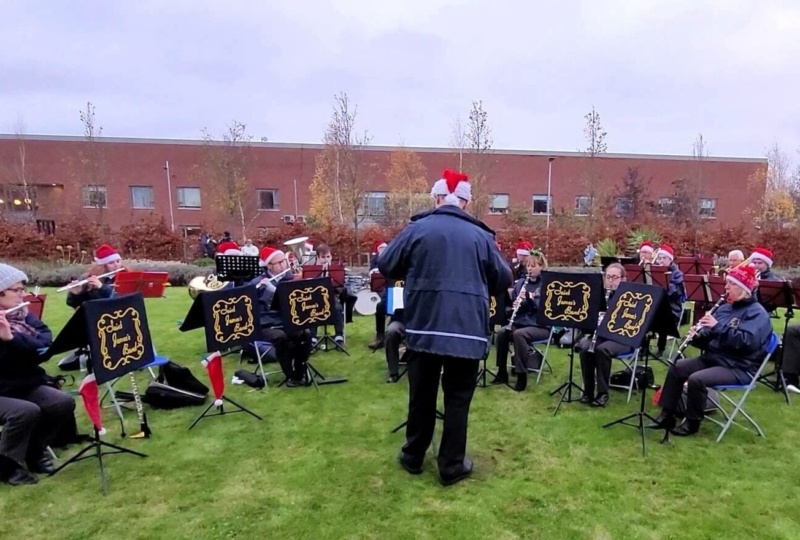An Nuacht is Déanaí
28 Feabhra 2022
Culture Near You: St. James's Brass Band

Culture Near You is an online map of culture in Dublin. We’re constantly adding to this cultural map so we get to meet lots of the great people featured, and we thought you might like to meet them too!
For this blog series, we’re meeting the makers, the movers and shakers, the partakers, and the doers of the map - to find out more about what they do in the city. Find out more about Culture Near You and how to get involved.
Meet John
John Daly is a long serving member of St. James’s Brass and Reed Band, as well as being the Treasurer.
Founded in the early 1700s, the St. James’s Brass and Reed Band is considered Ireland’s oldest band. John took some time out to tell us about his love of music, what life is like as a member of the band, and about having a Guinness World Record holder among their number.
Can you tell tell us a bit about the history of St. James’s Brass and Reed Band?
We’re there since 1737, and are Ireland’s oldest band. I think at that time the Liberties and Kilmainham had lots of mills and tanneries and other trades, so I think it was originally a Tanner's band. It was formally founded in 1800, and that may have been an amalgamation of a number of smaller bands from different trades. But it was associated with trades for years and years as well but it's always been in the parish. It's been in various places, it was in Bridgefoot Street, it was down on the Quays and it’s been in Mount Brown since the 1940s. We also have a new band hall down there, which is only 15 years old and state of the art.
What instrument do you play? How did you come to be involved with the band?
I was in a band at school and I was given the tuba to play. I liked the instrument and I loved being in the band in school, it was an alternative to sport. I was in the school band for six years and then after that I joined St. James’s Brass and Reed Band in 1980.
The first thing that came up was the St. Patrick’s Day Parade. I’d never marched so I got an awful shock! The parade went from Stephen’s Green to Broadstone and it was very cold, but I took to the marching in the end.
We did a lot of work for local authorities in those days - when I was a young fella we could’ve been out every Sunday in the summer playing bandstands in parks and things like that.
Do you have a favourite or memorable event that you played as part of the band?
One of the most memorable events for me was the St. Patrick’s Parade in Dublin in 1988, the millennium year.
The band led the parade, there were about 40 in the band that day, we were in the front and it was great. It was great for a lots of reasons, and one of these was because we were first out in the parade. So we were finished at about a quarter past one at the far end and it was the first time in years that we were able to get out of town and get a pint in Kilmainham before the pubs closed at 2 o’clock!

That was one highlight, that and another favourite is that we go to Clonakilty every year for a competition. The South of Ireland Band Championships are held in Clonakilty every July, and we won that a couple of times, so that’s always been a great thing to do. It’s a huge social event. Nearly every band in the country turns up at it, so it’s great fun.
What do you enjoy most about being a member of the band?
I enjoy the playing, the music, and the company of the people. A lot of them I’d know for well over 30 years and most of the people in the band are from the locality - Kilmainham, Inchicore, Ballyfermot, Crumlin, Walkinstown, that sort of area so it’s a sort of network. And I enjoy being the treasurer of the band, looking after the finances. I also like going away with the band, meeting other bands - that’s a huge part of it.
What advice would you have for someone who might like to learn to play an instrument, but isn’t sure where to start?
Unfortunately, we don’t teach anymore. So, I’d suggest that they should go and listen to a band to see if they like the music and the sound, but the most important thing I’d say is to go and get proper tuition. Particularly if you’d like to be a drummer - the best drummers are the drummers that can read music. So yes, get lessons and then go into a band where there’s a structure - where there’s a junior band that feeds into a senior band. You get people your own age when you join a junior band, and the social part of it and the friendship part of it is as important as the music.
What type of music does the band play?
We do everything. We play sacred music, so we play at mass, at weddings, and funerals too. When we go out to a park or a bandstand, we play things like popular music from films and musicals. You have to cater for people who want to hear lighter music. Those are enjoyable to play and it’s always great to see people, particularly kids, enjoying the band. That's the most important thing - that you give people a reason to want to come back and listen to the band again.

What are you most looking forward to at St. James’s Brass Band in the coming weeks and months?
We’re hiring a new conductor at the moment, so we’re looking forward to having them in place soon, and what that will bring to the band. That hopefully will refresh the band after Covid and hopefully bring new people in too, which we’re always looking to do.
Is there a mix of ages in the band?
Yes, we have had a few players related to band members that are 16 or so, but generally we have all ages from 18 up and we have some members in their 80s. We had a tuba player in the band, John Gannon, who got into the Guinness Book of World Records for longest serving band member in a civilian band.
He lived in Oliver Bond Street flats, moved into one of those when they were new and lived there all his life, until he moved out to live with his daughter in Clondalkin in his 90s. He died four months before his 100th birthday, and was a playing member of the band up until a few years before.
Another very interesting thing we’ve found in the last 10 years or so is that we've got quite a number of people who are aren’t Irish-born that have come to live here. We have had members from central and eastern European countries in particular, where there would be a great tradition of town bands. We’ve two lads from Moldova, we’ve had Germans, French, Spanish, Polish and Portuguese, and I think we had a Lithuanian trumpet player at one stage. It’s very much a part of their lives, particularly if you come from a small town or village. Unlike a language, if you look at a sheet of music everyone can read it - it’s completely universal.

If someone would like to get involved with the Band, how should they get in contact with you?
We have the St. James's Brass Band website where you can find our email address and phone number for anyone who’d like to get in touch. We have our rehearsal times up there too so you can always come along and knock on the door (but generally it’s always best to give us a call first).
Discover more
Check out the St. James's Brass Band website to learn more and find out how you can get involved.
If you'd like to discover bands, musicians, choirs, musical societies in your neighbourhood, search "music" on Culture Near You.
